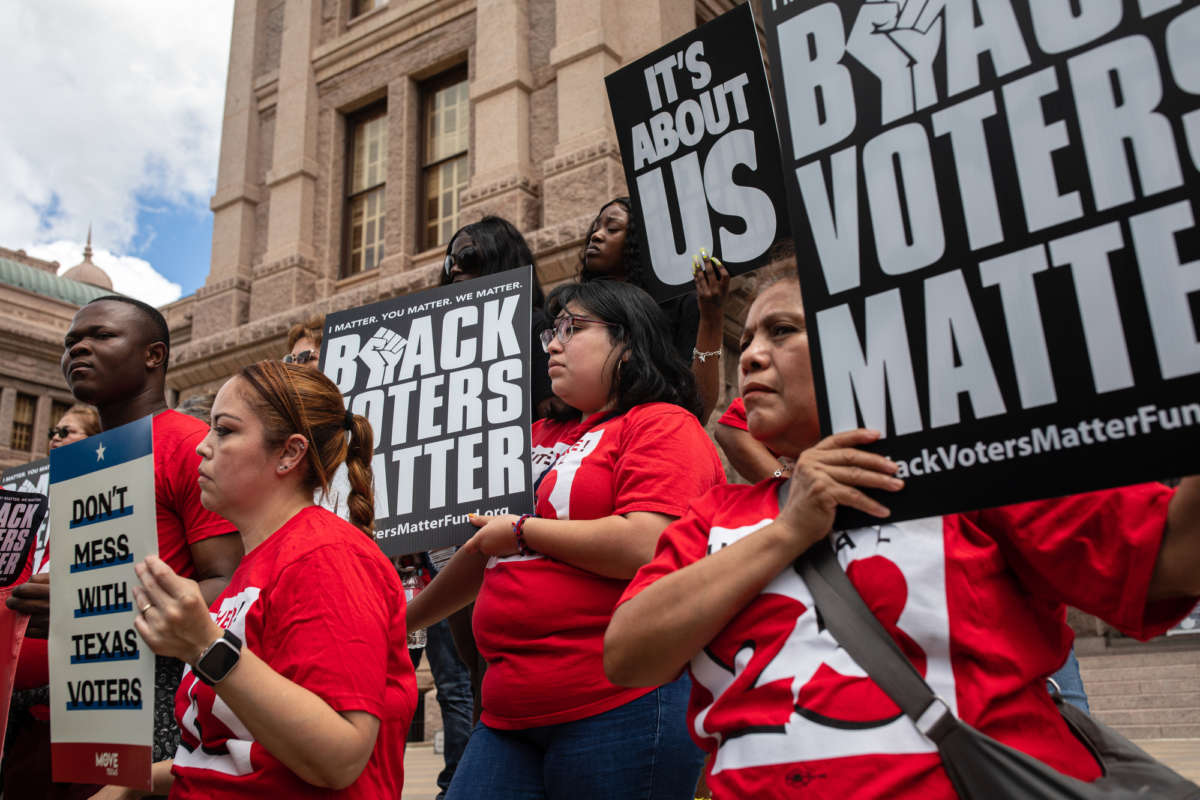Did you know that Truthout is a nonprofit and independently funded by readers like you? If you value what we do, please support our work with a donation.
Despite weeks of protest by Democrats in the state, Texas Republicans succeeded this week in passing their sweeping voter suppression law, which will make it harder for voters with disabilities and non-white voters in the state to cast a balllot. It now goes to Gov. Greg Abbott, who has vowed to sign it.
The bill has long been decried by Democrats and advocates as a push by Republicans after the 2020 election to draw lines between who is and isn’t allowed to vote. It takes aim at measures that have historically driven turnout from Black and Latinx voters and other disenfranchised groups.
The bill, S.B.1, outlaws drive-through voting, for instance — a method of voting widely used by non-white voters to cast a ballot last year. Drive-through voting, which some counties had rolled out for the 2020 election, was a popular method, with about 1 in 10 early voters in Harris County casting their ballot that way.
Harris County, the state’s most populous county, had also implemented a 24-hour early voting program that officials offered for one day. Republicans also outlawed 24-hour voting in their bill, taking special issue with Harris county’s methods to increase turnout — perhaps partly because the county voted for President Joe Biden by a margin of nearly 30 points in 2020.
The Texas GOP is also creating hurdles for disabled people to vote. Some people with disabilities need another person to assist them in filling out a ballot. But the new bill will create an application process for people assisting others in voting and anyone assisting a disabled voter could potentially face criminal penalties if they perform a misstep.
S.B.1 contains a wide swath of other restrictions as well. For example, it makes it a felony for election officials to send out unsolicited mail-in ballot applications — another direct response to a Harris County initiative — and calls for stricter voter ID requirements for voting by mail. Further, the bill empowers partisan poll watchers who could intimidate voters when they go to cast a ballot and creates a monthly review system to check voter rolls for noncitizens. Though there are few to no documented cases of noncitizens voting in Texas, it did not stop Donald Trump from propagating the lie that it was a widespread problem.
Democratic lawmakers in Texas had fled the state for over a month to deny the legislature quorum and block the bill. But enough lawmakers returned after Republicans voted to threaten them with arrest warrants for the GOP’s marquee bill to pass.
Advocates, journalists and Democrats decried the passage of S.B.1. “The Texas legislature just passed its egregious voter suppression bill,” tweeted University of California, Berkeley professor and former Labor Secretary Robert Reich. “Meanwhile, voting rights legislation languishes in the Senate because [Senators Joe] Manchin and [Kyrsten] Sinema refuse to work around the filibuster. This is how democracy dies.”
Harris County Judge Lina Hidalgo vowed to fight the legislation. “The voter suppression bill has passed the legislature in Texas. We won’t give up now. We will fight this in court,” she wrote on Twitter. “And we will work relentlessly so voters in Harris County, from both parties, can cast a ballot despite these shameless suppression efforts.”
Abbott, a Republican, said in a statement shortly after the bill was passed that he is planning to sign S.B.1 into law, citing spurious concerns about so-called election integrity. Republicans have offered a variety of excuses to implement such widespread voting restrictions in what was already one of the hardest states in which to cast a vote.
But the Texas GOP’s intentions, much like the intentions of Republicans across the country trying to implement similar restrictions, are transparent: They want to make it harder to vote, especially for populations that they perceive to be Democrats, so that they never lose an election again.
After failing to manipulate and then overturn the 2020 election — including attempting to cover up a violent attempted coup — Republicans have all but outright said that their goal is to ensure Republican wins in presidential and down ballot elections.
This statement by Sen. Lindsey Graham (R-South Carolina) last year is just one example of countless others made by Republicans across the U.S.: “If we don’t do something about voting by mail, we’re going to lose the ability to elect a Republican in this country.”
It’s not just voter restrictions that Republicans are pushing, however. Texas Republicans are prepared to pull off yet another gerrymandering session that will turn the tides even further in their favor, after having pulled off an extremely bold partisan gerrymandering map 10 years ago.
Press freedom is under attack
As Trump cracks down on political speech, independent media is increasingly necessary.
Truthout produces reporting you won’t see in the mainstream: journalism from the frontlines of global conflict, interviews with grassroots movement leaders, high-quality legal analysis and more.
Our work is possible thanks to reader support. Help Truthout catalyze change and social justice — make a tax-deductible monthly or one-time donation today.
